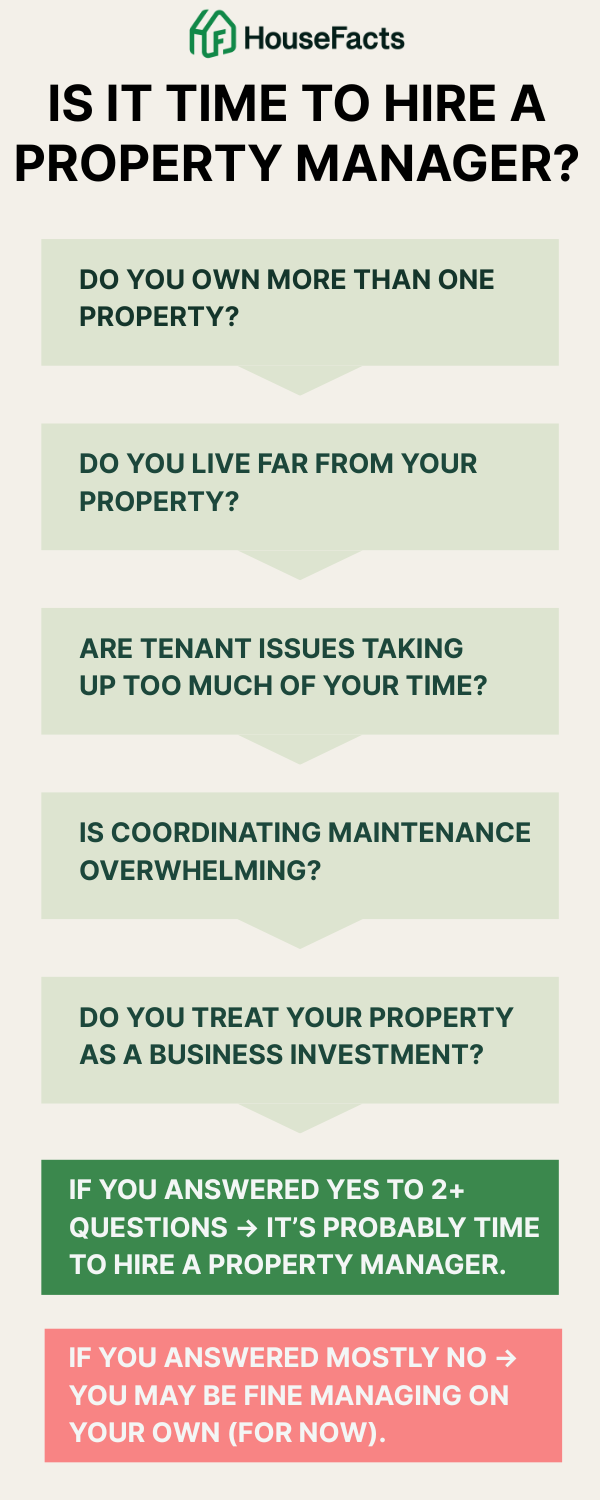Owning a property can be a great investment, but with ownership comes responsibility. From handling possible tenant requests to coordinating repairs, the workload can quickly pile up, especially if you own more than one property or live far away. At a certain point, many owners face the question: Is it time to hire a property manager?
This guide walks through the signs you might need professional help, how to find the right property manager, and what to do upfront to ensure the partnership runs smoothly.

Signs It’s Time to Hire a Property Manager
- You own multiple properties
- The more doors you manage, the harder it is to juggle bills, upkeep, and communication. A property manager can centralize all of this so nothing slips through the cracks.
- You live far from the property
- Whether it’s a rental, vacation home, or family property you don’t occupy full-time, distance makes it difficult to handle emergencies or routine tasks. A local manager provides peace of mind by being there when you can’t.
- Day-to-day issues are eating up your time
- For landlords, that might mean tenant screening or late rent. For homeowners, it could be scheduling cleaners, landscapers, or repair appointments. A property manager takes those daily headaches off your plate.
- Maintenance has become overwhelming
- Coordinating plumbers, electricians, contractors, or seasonal services is practically a full-time job. Managers often have trusted vendors they can call on quickly and at better rates.
- You want to treat your property like an investment
- Whether your goal is generating steady rental income or simply protecting the long-term value of your home, professional oversight helps safeguard your asset and maximize returns.
How to Find the Right Property Manager
- Get referrals
- Ask local homeowners, landlords, real estate agents, or neighborhood groups. Firsthand experiences are often more reliable than ads. If you don’t have anyone in your circle to ask, online communities like BiggerPockets are widely used by property owners to find trusted managers and share recommendations.
- Check credentials and experience
- In some states, managers need licenses. Beyond that, ask about their background: Do they manage homes like yours (rentals, vacation properties, luxury residences)?
- Understand their fee structure
- Most rental-focused managers charge 8–12% of monthly rent, while some personal-home management services work on flat or hourly fees. Transparency is key—watch for hidden costs.
- Evaluate their systems and tools
- From online rent collection to digital maintenance logs, or from scheduling landscapers to tracking cleaning services, a good manager should have modern systems that make your life easier.
- Interview multiple candidates
- Treat it like hiring a long-term partner. Ask how they handle emergencies, how they communicate with you, and how they measure success. Whether that’s low vacancy rates, smooth household operations, or simply fewer headaches for you.
Setting Yourself Up for Success
Hiring a property manager isn’t a “set it and forget it” move. To get the most out of the relationship:
- Be clear about your goals. Do you want steady long-term tenants, or do you prefer higher turnover with potentially higher rents?
- Stay organized. Nearly two-thirds of homeowners say they struggle to find important property documents when they need them most (DomiDocs). Having lease agreements, maintenance records, and contractor details in one place prevents miscommunication and wasted time. Digital tools like HouseFacts make this easier by centralizing your property history so your new manager has a single, reliable source of truth from day one.
- Schedule regular check-ins. Quarterly reviews keep both sides aligned on financials, maintenance, and tenant satisfaction.
- Review performance annually. If vacancies are high or costs balloon, reassess whether the manager is delivering value.
Final Thoughts
A property manager can be a game-changer, freeing up your time and ensuring your investment runs smoothly. But success depends on choosing the right partner and setting the relationship up thoughtfully from the start.
That setup often comes down to organization—when your documents, property details, and maintenance history are easy to access, your manager can focus on strategy instead of scrambling for information. With tools like HouseFacts, you can reduce the risk of lost paperwork and make the handoff seamless, ensuring your property manager is set up to deliver real value.
By knowing the signs it’s time to hire, doing your due diligence, and staying organized, you’ll set yourself, and your property, up for long-term success.




